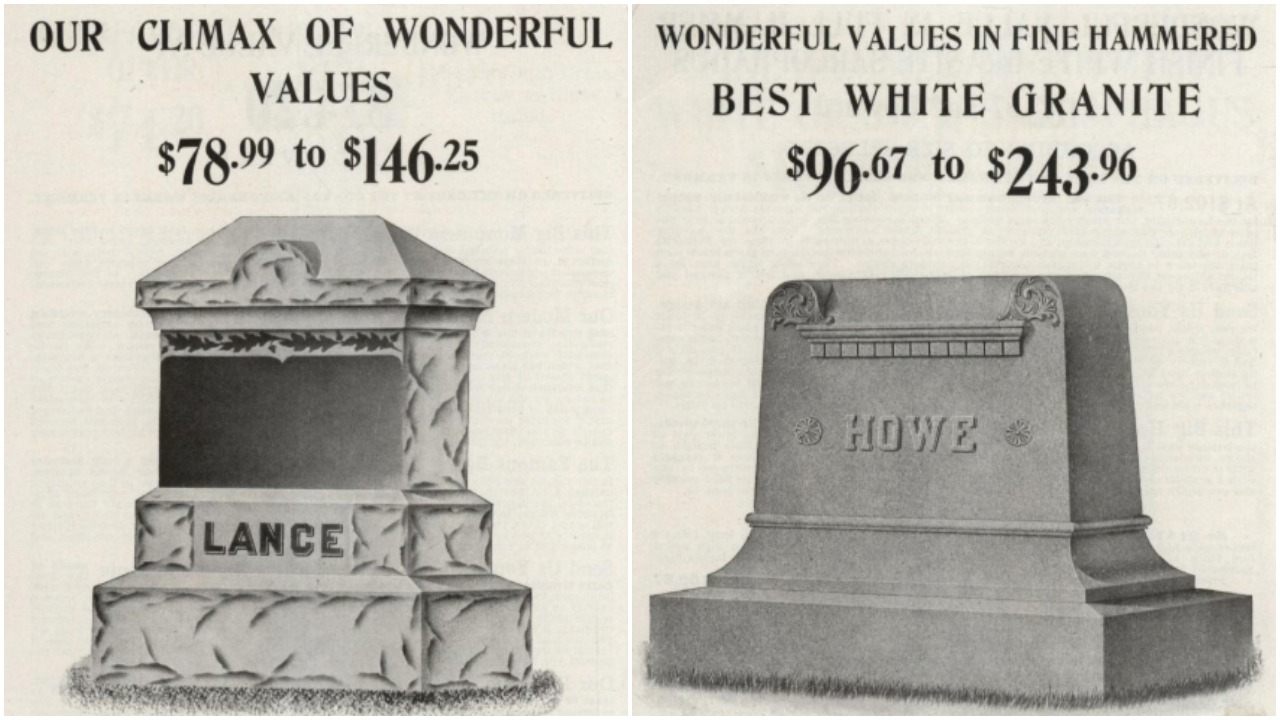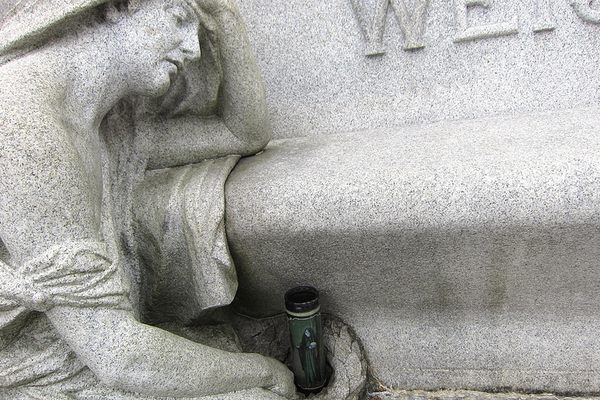Sears Once Offered Mail-Order Tombstones
Its beloved catalogue had a good run.

This month, 126 years after its founding, American retail giant Sears officially filed for bankruptcy.
Before the super-sized department store chain began dominating suburban landscapes and fluorescent malls across the country, it existed solely as a mail-order catalogue that initially specialized in jewelry and watches, but quickly grew to include almost everything in the universe. In 1895, only three years after first incorporating as a business, the catalogue boasted 532 pages. Among the things for sale in this encyclopedia of goods were bicycles, groceries, sewing machines, medicinal cocaine, and electric radiators. But perhaps the most surprising product in this groundbreaking “Consumers’ Bible” was a practical but rather morbid one: affordable tombstones.
In 1906, the mega-company published a specialized “Tombstones and Monuments” mailer, advertising it as a “Catalogue of Memorial Art in Granite and Marble.” Sears’ prices, which beat out traditional funeral parlors’ significantly, allowed consumers to participate in the elite practice of custom-ordering grave markers. In a section titled “Direct from Quarry to Cemetery,” the catalogue promised “Prices within the reach of your pocketbook and in designs heretofore possible only to the wealthy.” With the caveat that these memorializing stones be paid in full in advance of being shipped, families could purchase a “White Granite Marker” for as low as $8.60 or a sweet heart-shaped monument starting at $4.20. Obvious inflation aside, this was a bargain!


For those with a larger commemorative budget, imposing headstones like “A Royal Sarcophagus in the Best Dark Barre Granite” were offered in five different sizes, the smallest costing $113.87. All the lettering was done in-house for the customer, with characters one inch or under costing only 12 cents. Keeping it short made for a steal.
Design options were as numerous as the range of prices offered, depending on the level of detail or text requested. Sears’ granite was touted as coming “from the best quarry in the Barre Mountains of Vermont,” and the Dark Veined and White Rutland Italian Marble was illustrated as having “the best developed strata and veins of the Rutland district in Vermont.” To further drive the point home, in case customers were more concerned with stone quality than a recent death in the family, Sears generously offered to mail “a small sample piece of polished Best Barre Granite” for a mere 75 cents. Now that’s customer service. For the more distraught and distracted, pre-selected epitaphs, described within as “memorial verses,” were listed in the back of the 149-page publication. A price list, unsurprisingly, accompanied the mournful messaging. “Gone, but not forgotten,” a gentle send-off, would be engraved for 47 cents; “Budded on earth to bloom in Heaven,” was a 70-cent phrase.

The advertising and marketing team behind Sears was on point, which is no doubt a major reason for their success; within the first few pages of the catalogue, tombstone testimonials abounded. The bereaved reported how pleased they were to find a company willing to make death a little easier. Mrs. Arabella G. Clarke of Pike, New Hampshire wrote, “Dear Sirs:—The tombstone I received from you is set in Haverhill Cemetery, and I drove out to see it today. I wish to express to you how completely surprised I was with it. It seemed to far surpass your description of it. Did not expect so elegant a stone for the money.” But wait, there’s more! “There are many costly stones in the cemetery, but saw none I should prefer to the one ordered from you.”
In 1993, Sears terminated its catalogues altogether. Bargain headstones—and all their other offerings—haven’t been available by mail-order order since. Today, we take a moment to mourn the tombstone catalogue, along with Sears itself.










Follow us on Twitter to get the latest on the world's hidden wonders.
Like us on Facebook to get the latest on the world's hidden wonders.
Follow us on Twitter Like us on Facebook